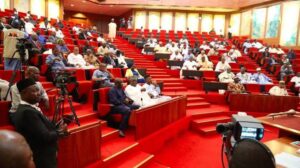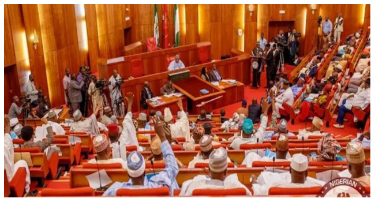In a significant development, the Senate has announced plans to summon several major stakeholders in Nigeria’s petroleum sector, including the Central Bank of Nigeria (CBN), Nigeria Port Authority (NPA), Nigerian National Petroleum Company Limited (NNPCL), Dangote Group, and Minister of State for Petroleum, Heineken Lokpobiri. This action is part of an ongoing investigation into alleged economic sabotage within the industry.
The revelation was made by the Leader of the Senate and Chairman of the Senate ad-hoc committee on “Alleged Economic Sabotage in the Nigerian Petroleum Industry” during a media briefing on Thursday. The chairman disclosed that the 14-member committee, constituted on July 23, is tasked with investigating the billions of dollars spent on the turnaround maintenance of state-owned refineries over the past decade. The aim is to address the entrenched challenges that have plagued Nigeria’s petroleum sector.
A public hearing is scheduled for September 10, where contractors responsible for the turnaround maintenance of the refineries are expected to testify. In preparation for this hearing, the ad-hoc committee plans to visit key locations in the petroleum industry, including Lagos, Port Harcourt, and Warri, to engage directly with industry stakeholders.
Committee members have expressed a strong commitment to uncovering the deep-seated issues within the sector. They have declared that it will no longer be business as usual, emphasizing that there will be no sacred cows. The committee is prepared to issue warrants of arrest to any agency heads who fail to honor the invitation to appear before them.
**Dangote Group and Regulatory Authorities Clash**
This move by the Senate follows a recent clash between the Dangote Group and Nigeria’s regulatory authorities. The Dangote refinery has been accused of producing substandard products, a claim that the NNPCL has vehemently denied. In response to these allegations, the leadership of the House of Representatives conducted an inspection tour of the refinery in Lagos State. Lawmakers are now actively investigating the claims of inferior products from the refinery.
 The controversy has escalated, with the House of Representatives calling for the suspension of the Chief Executive of the Nigerian Midstream and Downstream Petroleum Regulatory Authority (NMDPRA), Farouk Ahmed. This call for suspension came after Ahmed made what were described as “unguarded comments” about the quality of products from the Dangote refinery.
The controversy has escalated, with the House of Representatives calling for the suspension of the Chief Executive of the Nigerian Midstream and Downstream Petroleum Regulatory Authority (NMDPRA), Farouk Ahmed. This call for suspension came after Ahmed made what were described as “unguarded comments” about the quality of products from the Dangote refinery.
In the wake of this saga, several Nigerian businessmen and politicians have rallied in support of the Dangote Group, advocating for stronger support for entrepreneurs in the country. They argue that nurturing local businesses is crucial for the nation’s economic development.
Looking Ahead
The Senate’s investigation into alleged economic sabotage in the petroleum industry signals a potentially transformative moment for Nigeria’s oil and gas sector. With billions of dollars at stake and a history of inefficiencies and corruption to contend with, the outcomes of these investigations could lead to significant reforms.
As the ad-hoc committee prepares for its public hearing and site visits, the industry and the public alike are watching closely. The committee’s determination to bring accountability and transparency to the sector underscores the urgent need for reform. If successful, this initiative could pave the way for a more efficient, transparent, and economically beneficial petroleum industry in Nigeria.
This ongoing saga also highlights the broader challenges facing Nigeria’s regulatory environment. The clash between the Dangote Group and regulatory authorities underscores the need for clear, fair, and consistent regulatory practices that support, rather than hinder, the growth of local enterprises.
In summary, the Senate’s actions and the subsequent investigations represent a critical juncture for Nigeria’s petroleum industry. The coming months will be crucial in determining the future landscape of the sector and the broader economic implications for the country. Readers are encouraged to stay informed as these developments unfold, given their potential impact on Nigeria’s economic stability and growth.




